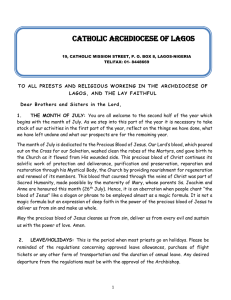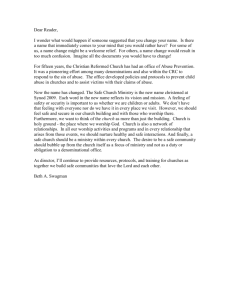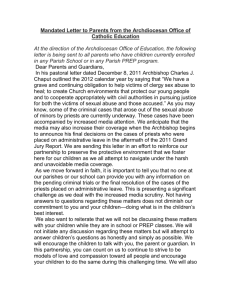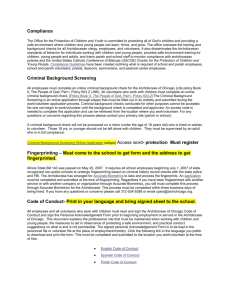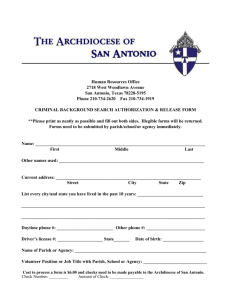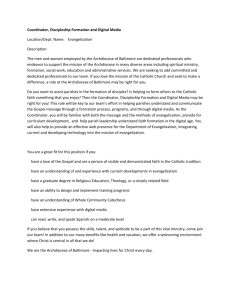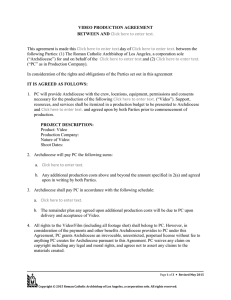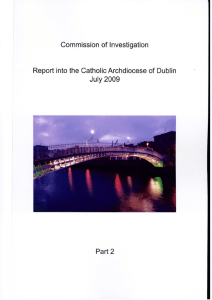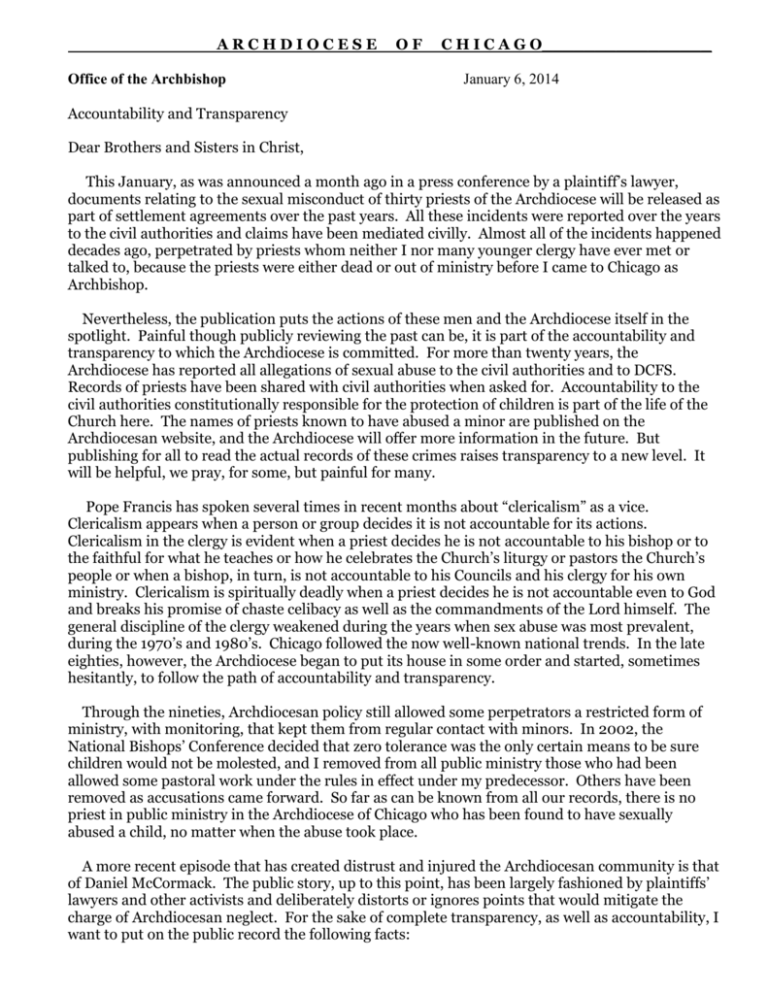
ARCHDIOCESE
Office of the Archbishop
OF
C H I C A G O________________
January 6, 2014
Accountability and Transparency
Dear Brothers and Sisters in Christ,
This January, as was announced a month ago in a press conference by a plaintiff’s lawyer,
documents relating to the sexual misconduct of thirty priests of the Archdiocese will be released as
part of settlement agreements over the past years. All these incidents were reported over the years
to the civil authorities and claims have been mediated civilly. Almost all of the incidents happened
decades ago, perpetrated by priests whom neither I nor many younger clergy have ever met or
talked to, because the priests were either dead or out of ministry before I came to Chicago as
Archbishop.
Nevertheless, the publication puts the actions of these men and the Archdiocese itself in the
spotlight. Painful though publicly reviewing the past can be, it is part of the accountability and
transparency to which the Archdiocese is committed. For more than twenty years, the
Archdiocese has reported all allegations of sexual abuse to the civil authorities and to DCFS.
Records of priests have been shared with civil authorities when asked for. Accountability to the
civil authorities constitutionally responsible for the protection of children is part of the life of the
Church here. The names of priests known to have abused a minor are published on the
Archdiocesan website, and the Archdiocese will offer more information in the future. But
publishing for all to read the actual records of these crimes raises transparency to a new level. It
will be helpful, we pray, for some, but painful for many.
Pope Francis has spoken several times in recent months about “clericalism” as a vice.
Clericalism appears when a person or group decides it is not accountable for its actions.
Clericalism in the clergy is evident when a priest decides he is not accountable to his bishop or to
the faithful for what he teaches or how he celebrates the Church’s liturgy or pastors the Church’s
people or when a bishop, in turn, is not accountable to his Councils and his clergy for his own
ministry. Clericalism is spiritually deadly when a priest decides he is not accountable even to God
and breaks his promise of chaste celibacy as well as the commandments of the Lord himself. The
general discipline of the clergy weakened during the years when sex abuse was most prevalent,
during the 1970’s and 1980’s. Chicago followed the now well-known national trends. In the late
eighties, however, the Archdiocese began to put its house in some order and started, sometimes
hesitantly, to follow the path of accountability and transparency.
Through the nineties, Archdiocesan policy still allowed some perpetrators a restricted form of
ministry, with monitoring, that kept them from regular contact with minors. In 2002, the
National Bishops’ Conference decided that zero tolerance was the only certain means to be sure
children would not be molested, and I removed from all public ministry those who had been
allowed some pastoral work under the rules in effect under my predecessor. Others have been
removed as accusations came forward. So far as can be known from all our records, there is no
priest in public ministry in the Archdiocese of Chicago who has been found to have sexually
abused a child, no matter when the abuse took place.
A more recent episode that has created distrust and injured the Archdiocesan community is that
of Daniel McCormack. The public story, up to this point, has been largely fashioned by plaintiffs’
lawyers and other activists and deliberately distorts or ignores points that would mitigate the
charge of Archdiocesan neglect. For the sake of complete transparency, as well as accountability, I
want to put on the public record the following facts:
1. Neither in Chicago nor in any previous posting as a bishop or a religious superior have I
assigned to pastoral ministry or transferred for ministry a priest whom I knew to have
sexually abused a child.
2. When I came to Chicago as Archbishop, Fr. Daniel McCormack had a reputation as a
dedicated priest and an effective pastor. He had been ordained by Cardinal Bernardin, who
vetted his seminary record. He was already, before I became Archbishop, appointed to a
seminary faculty, a position of trust. He had been elected by his peers to represent them on
the priests’ placement board, a sign of confidence in his judgment by those who knew him
best. Just months before his first arrest, he was recommended by those who worked with
him in re-organizing the parishes on the west side to serve as dean for that area. He was
dedicated to ministry in African American parishes in poor neighborhoods. He was trusted
and admired.
3. The first association of his name with the possible sexual abuse of a minor was made for me
in September 2005, when I was told that the police had arrested him, questioned him about
the allegation and then released him without charges. He was put under monitoring and
his ministry with children restricted while the Archdiocese began to investigate whether
there was “reasonable cause to suspect” that he had sexually abused a child. The
investigation was hampered because the various offices involved did not consistently share
what they knew with each other or with me. Nor did the civil authorities share with the
Archdiocese what they came to know in their investigations. From the time he was arrested
and released to the time that he was arrested a second time and eventually pled guilty, no
one involved in investigating the allegation, not even the review board that struggled with
their justified concerns, told me they thought he was guilty.
4. After McCormack’s second arrest in January 2006, a number of incidents came forward
that might have served as warning signals along the way, if people had been more wary.
Each of them, when the record is fairly presented, was examined and responded to by the
authorities concerned. The response, in retrospect, was not always adequate to all the facts,
but a mistake is not a cover up.
This is not a story that fits the template that has been used to report sexual abuse in the Catholic
Church, which is why it’s difficult to set the record straight. Nor is the record, even when set
straight, one that any of us can easily put together with what we expect the Church to be. Telling
the truth does not create an excuse for failure. But it makes a difference, as we go forward, to
know in what the failure consists, to know that the truth has been told and that the Church is
committed to accountability and transparency.
Most of all, this Archdiocese is committed to trying to help victims of sexual abuse achieve the
freedom necessary to live with dignity. The Archdiocesan Office for the Protection of Children and
Youth is a ministry that brings hope and freedom to many victims. It is responsible for the
extensive system of background checks and training in child protection that every employee and
volunteer in the Archdiocese must undergo. Its story should be better known, again for the sake of
accountability and transparency.
Monetary recompense is part of helping victims and making reparation to them. The funding of
sexual abuse settlements comes from a stream of revenue entirely separate from regular donations
or investments. Over the years, the Archdiocese has bought a great deal of property for possible
institutional expansion. Sale of some of that undeveloped property is the source of the revenues
for funding sexual abuse settlements. It has not been and would not be used for normal
Archdiocesan operating expenses.
Finally, all our actions are transparent to the Lord, to whom each of us is accountable. He is a
merciful judge, and I ask you to commend to him in your prayers the victims, the perpetrators and
the Archdiocese at this time in our history. Once again, I apologize to all those who have been
harmed by these crimes and this scandal, the victims themselves, most certainly, but also rank and
file Catholics who have been shamed by the actions of some priests and bishops. Thank you and
God bless you.
Francis Cardinal George, O.M.I.
Archbishop of Chicago


